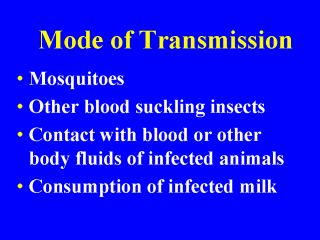 |
A wide variety of mosquito species (Aedes,
Culex, Mansonia, Anopheles, Entremapodites, etc.) act as the vector for transmission of
RVF virus. Uninfected mosquitoes feed on infected viraemic animals or humans and transmit
the infection to another host in their subsequent feed. Also, Aedes mosquitoes are capable
of transovarian transmission to offspring via eggs, so new generations of infected
mosquitoes may hatch from their eggs. This provides a durable mechanism for maintaining
the virus in nature, as the eggs of these mosquitoes may survive for periods of up to
several years in dry conditions. Possibly other blood suckling insects, as sandfly and
culicoides, could act as vectors. Also, transmission through direct handling of infected
animals or meat and contact with blood and other body fluids of infected animals were
documented. Consumption of raw milk of infected animals could be a possible mode of
transmission but consumption of meat of infected animals does not appear to be a common
means of transmission. |
